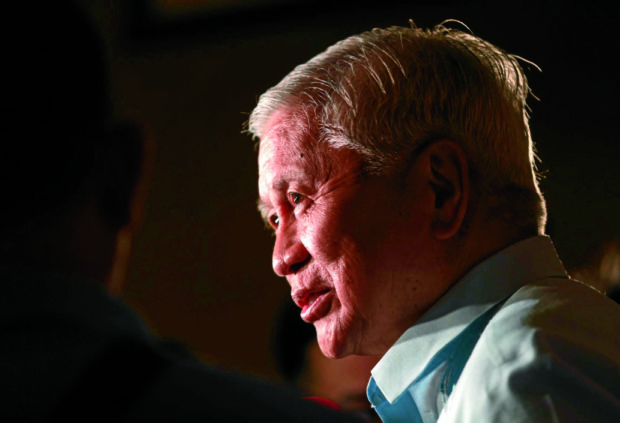
Former Foreign Affairs Secretary. Albert del Rosario (File photo by LYN RILLON / Philippine Daily Inquirer)
CEBU CITY, Cebu, Philippines — Calling the tensions in the South China Sea “the most complex geopolitical situation in the world,” President Ferdinand Marcos Jr. called on the Armed Forces of the Philippines to “guard carefully” the country’s territory, amid the unabated Chinese incursions into the West Philippine Sea, the area within the country’s exclusive economic zone.
Meanwhile, former Foreign Secretary Albert del Rosario said the President was “taking proper steps in defending the rights of the Philippines in the West Philippine Sea.”
Addressing government troops in one of several activities during his visit here on Monday, Mr. Marcos said the country now “fac[es] a more complex foreign situation.”
“There was a time [when] we did not have to worry about these threats and the intensification of the competition between the superpowers,” he said, adding that “we were able to maintain that peace and maintain that understanding with all of our neighbors.”
“Now things have begun to change and we must adjust accordingly,” the president said.
“That’s why I say the mission of the AFP… has changed. And we need to guard carefully on the things we didn’t think too much about before,” he said further.
Marcos emphasized that the AFP “will always stand up to the challenges that the Philippines faces in the best tradition of the military, in the best tradition of our heroes that have gone past.”
Protests, summons
The president made these remarks more than three weeks after a China Coast Guard (CCG) ship at Ayungin (Second Thomas) Shoal, just 195 kilometers off Palawan province, pointed a military-grade laser at a vessel of the Philippine Coast Guard (PCG), temporarily blinding its crew.
Last week, the National Task Force for the West Philippine Sea reported that at least 30 Chinese militia vessels and a CCG ship were found anchored off Ayungin as well as Sabina (Escoda) Shoal, about 135 km from Palawan, when the PCG conducted a maritime domain awareness flight last Tuesday.
Joint patrols
The Department of Foreign Affairs (DFA) had filed 77 protests against China, including 10 this year, on top of 195 diplomatic notes sent to China last year.
On Feb. 14, Marcos summoned Chinese Ambassador Huang Xilian “to express his serious concern over the increasing frequency and intensity of actions by China against the Philippine Coast Guard and our Filipino fishermen in their bancas.”
Del Rosario issued a statement on Monday supporting this and other moves by the president.
Del Rosario, chair of think tank Stratbase ADR Institute, said “we welcome that President Marcos Jr.’s administration is allowing joint patrols with like-minded nations in the West Philippine Sea and establishing additional locations under the US-Philippines Enhanced Defense Cooperation Agreement.”
“If successfully done, these are steps that have the effect of deterring Chinese aggressions against the Philippines,” said the retired diplomat, a former ambassador to the United States.
‘Policies of aggression’
Del Rosario said further that “all nations of the world, including the US and the Philippines, have an important stake in preserving the rules-based international order against the unlawful policies of aggression being pursued by the leaders of China and Russia.”
“Dismantling the rules-based international order would be catastrophic for humanity as the world would revert to a pre-World War II order where disputes were settled by force and where countless lives were meaninglessly lost through wars and invasions,” he added.
“We should not forget the lesson of the past world wars that a policy of appeasement toward aggressors resulted in disasters,” Del Rosario also said.
Sen. Risa Hontiveros, in a statement, said the country should look beyond its 1951 Mutual Defense Treaty with the United States and forge similar security arrangements with other countries.
“China will not stop until we surrender the West Philippine Sea so we must also show her that we will never stand down,” she said, adding that “China stands alone on this issue while we enjoy the support of many countries.”
Modernization
The PCG, meanwhile, said it aims to acquire “more than 20 offshore patrol vessels (OPVs)” to sustain its presence in the country’s waters, its spokesperson Commodore Jay Tarriela told ANC on Monday.
Currently, the PCG only has three OPVs capable of two-week deployment—two 97-meter ships acquired from Japan and a 93-meter boat from France.
The PCG has 10 smaller vessels that can only conduct short patrols.
Earlier, it called for more aircraft, port facilities, radars, and lighthouses for its modernization.